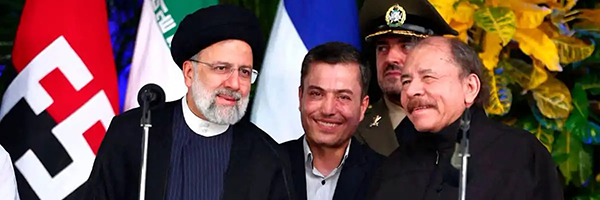Iran’s Raisi in Nicaragua: New World Order Far From US Interests, Washington Whines
 The president of Iran praised the resistance of the peoples of Iran and Nicaragua, deeming the US conspiracies against both nations to have failed.
The president of Iran praised the resistance of the peoples of Iran and Nicaragua, deeming the US conspiracies against both nations to have failed.
The president of Nicaragua, Daniel Ortega, welcomed his Iranian counterpart, Ebrahim Raisi, as a “brother president,” stating that both countries shared “signs from God,” noting the coincidence of the triumphs of the Islamic Revolution in February 1979 and of the Sandinista Revolution in July of the same year.
“Since the beginning of the victory of the Islamic Revolution in Iran, there has been an excellent fraternal relationship with our brothers in the Sandinista Revolution of Nicaragua,” Raisi stated during his meeting with Ortega this Tuesday, June 13.
“[Nicaraguans], over all these years, have resisted against the conspiracies of imperialism and have triumphed,” the Persian president added. He continued to note the similar resistances of the people of Iran and Nicaragua to Western interventions, stating that “the great people of Iran [also] know very well the conspiracies, tricks, and plans of the imperialist enemies,” yet have still “resisted and triumphed.”
The Iranian president described Tehran-Managua relations as “completely strategic,” since their ties “are not usual traditional relations,” adding that they “want to increase and deepen our relations in all areas; political, economic, cultural, and all other areas, especially in science and technology.”
He warned that the enemy wants to “disappoint the revolutionary peoples.” However, he celebrated that “the new world order is being formed in favor of the resistance and not in favor of US interests.”
Raisi also denounced the numerous and ongoing violations of human rights by the United States, stating that “they lie about their claims to equality and security,” noting the fact that “many violations of human rights by [and within] the US have been witnessed in various parts of the world.”
In a similar vein, he questioned the claims of the West and the United States when it comes to defending democracy, since they do not respect governments elected with the popular vote of their peoples when such governments do not comply with US interests.
Raisi, heading a high-level Iranian delegation, arrived at the Augusto César Sandino International Airport in Managua on Tuesday, where he was received by the foreign minister of Nicaragua, Denis Moncada Colindres, as well as several other ministers.
The president of Iran had also visited Caracas on Monday, following the formal invitation of the Venezuelan president, Nicolás Maduro, to visit the Bolivarian country. Caracas and Tehran signed 25 strategic cooperation agreements across different sectors. Cuba will be the last stop of the Iranian president during his first tour of Latin American countries.
Visit to parliament
On Wednesday, June 14, President Raisi visited the National Assembly of Nicaragua, meeting legislators with whom he shared his views on the world imperialist system and its ineffective anti-democratic policies.
According to the Iranian president, Washington is afraid of justice, conscience, and the popular will of people, since these pillars of democracy are contrary to its interests. He stated that it is the conscience of the peoples, as well as the governments and parliaments of sovereign countries, that are necessary to guide the fight for freedom and justice.
President Raisi, developing his criticism on US imperialism, continued to explain that the US would typically send armies or use its local agents to impose its will, and now it also resorts to economic sanctions to achieve his purposes. He also warned that such illegal measures will not be the last mechanism for the United States to impose its will, but reaffirmed that the Iranian people will turn aggression toward them into an opportunity to strengthen themselves, as reported by Al Mayadeen.
Washington whining around
According to mainstream outlets, John Kirby, the spokesperson for the White House National Security Council, exhibited US frustration this Monday at Iranian authorities for touring Latin America, a region that the US considers its so-called “backyard.” Kirby labeled Raisi’s tour as destabilizing and contrary to “regional” interests.
“We don’t ask countries in this hemisphere or any other to choose who they’re going to associate with,” said Kirby, “or who they’re going to talk to, or who they’re going to allow to visit. That’s for them to speak to,” forgetting the countless “non-verbal diplomatic notes” sent by the US Department of State to different countries across the world criticizing and ordering countries not to meet with the authorities of any country that does not follow Washington’s orders, such as Iran.
Kirby urged Latin American nations to “reject Iran’s destabilizing activities” and “support international efforts to restore peace and stability in the Middle East.” International experts ironically note the fact that “destabilizing activities” is exactly the role Washington plays in West Asia, the US being seen as the most significant force against restoring peace and stability in that region.
